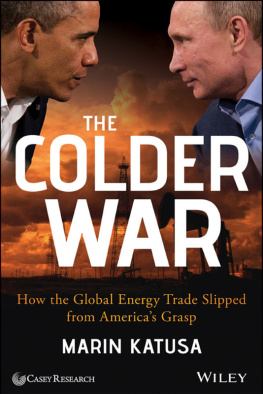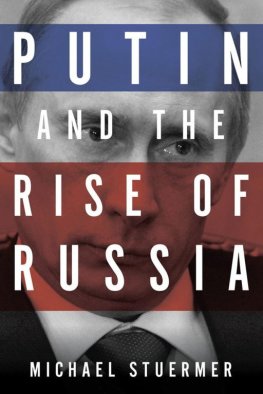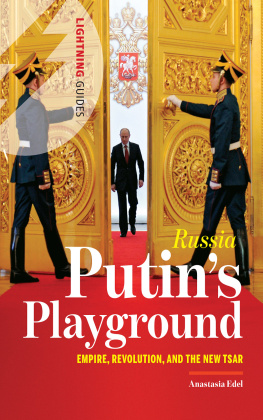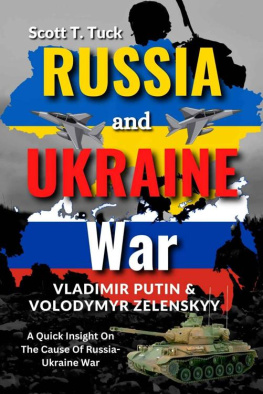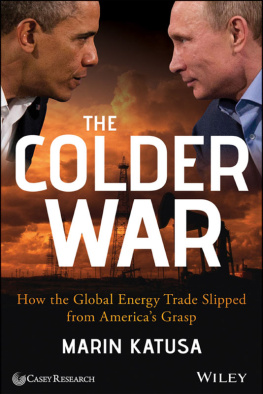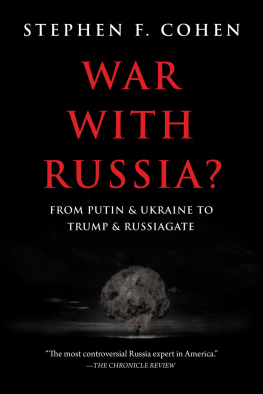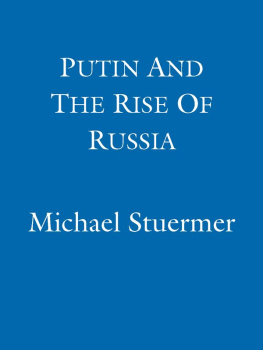
THE COLDER WAR
How the Global Energy Trade Slipped from Americas Grasp
Marin Katusa
Cover design: Jan Linke
Cover Images: Obama/Putin: Evan Vucci/Associated Press; clouds/oil field Mick Roessler/Corbis
Copyright 2015 by Marin Katusa. All rights reserved.
Published by John Wiley & Sons, Inc., Hoboken, New Jersey, and Casey Research, LLC, Stowe, Vermont.
Published simultaneously in Canada.
No part of this publication may be reproduced, stored in a retrieval system, or transmitted in any form or by any means, electronic, mechanical, photocopying, recording, scanning, or otherwise, except as permitted under Section 107 or 108 of the 1976 United States Copyright Act, without either the prior written permission of the Publisher, or authorization through payment of the appropriate per-copy fee to the Copyright Clearance Center, Inc., 222 Rosewood Drive, Danvers, MA 01923, (978) 750-8400, fax (978) 646-8600, or on the Web at www.copyright.com. Requests to the Publisher for permission should be addressed to the Permissions Department, John Wiley & Sons, Inc., 111 River Street, Hoboken, NJ 07030, (201) 748-6011, fax (201) 748-6008, or online at http://www.wiley.com/go/permissions.
Limit of Liability/Disclaimer of Warranty: While the publisher and author have used their best efforts in preparing this book, they make no representations or warranties with respect to the accuracy or completeness of the contents of this book and specifically disclaim any implied warranties of merchantability or fitness for a particular purpose. No warranty may be created or extended by sales representatives or written sales materials. The advice and strategies contained herein may not be suitable for your situation. You should consult with a professional where appropriate. Neither the publisher nor author shall be liable for any loss of profit or any other commercial damages, including but not limited to special, incidental, consequential, or other damages.
For general information on our other products and services or for technical support, please contact our Customer Care Department within the United States at (800) 762-2974, outside the United States at (317) 572-3993 or fax (317) 572-4002.
Wiley publishes in a variety of print and electronic formats and by print-on-demand. Some material included with standard print versions of this book may not be included in e-books or in print-on-demand. If this book refers to media such as a CD or DVD that is not included in the version you purchased, you may download this material at http://booksupport.wiley.com. For more information about Wiley products, visit www.wiley.com.
ISBN 9781118799949 (Hardcover)
ISBN 9781118800058 (ePDF)
ISBN 9781118800072 (ePub)
To my wife, Marina.
Your support and undying love carry me in all I do.
Foreword
Let me be candid. I really like this book because it's original, it's well reasoned, and its conclusions are correct. It's important that you read it.
Let me take a couple of pages to explain why the subject of energy is even more important than most people imagine, and why Marin is not only the right man to explain it but a winning player in the rough-and-tumble energy arena.
Marin wasn't planning to write a book until I twisted his arm. Although he's a competent writer, as you'll see, he's first and foremost a deal maker. But what has brought him so much success in that career is being a preternaturally shrewd analyst and an independent big-picture thinker. His take on many thingsnot least the Putinization of energy and the incipient Colder Waris likely to give you a new view on what is going on in the world. He won't be echoing the conventional wisdom you're likely to hear on network TV or read in the New York Times.
Energy
It's a commonplace that the world runs on energy, but few appreciate the mercilessness of that truth for an industrialized world. Putting it quite simply, energy is the sine qua non of civilization itself. Without large quantities of it, most of us would literally starve and would do so while freezing in the dark.
Your food requires large quantities of fossil fuel to be grown, packaged, transported, refrigerated, and later cooked. That dependence may not be ideal, but it's reality for at least another generation of mankind. For your car to run, for planes to fly, and for trucks and trains to deliver goods, it's going to take a lot of fossil fuel for many years to come. Fossil fuels are the raw material for many of the things we use, from plastics to clothing. Without a river of energy, you can forget about communications, TV, computers, and the Internet. Without oil, natural gas, coal, and nuclear power, modern civilization would wither in a matter of days.
But that's only a description of how things are now. Despite greenism and the widespread enthusiasm for the idea of conservation, energy isn't going to become less important; it's going to become vastly more important. The Second Law of Thermodynamics states, in essence, that without continual inputs of energy, all systems wind down. Entropy, like gravity, conquers all. Only inputs of energy can hold the process at bay.
The world's population will likely grow to 10 billion people by the end of the century, and their energy requirements will grow much, much faster. Today two-thirds of all people are still poor and consume little energy. As they approach a Western standard of living, they're going to want moresay, about 10 times morethan they have now of the things you and I take for granted. And all those things are made with energy inputs and run on more energy inputs.
Now, it's true that technology is making rapid improvements in the efficiency of renewable or sustainable energy, mainly solar and wind. They will likely become economical, at some point, for many applications. But in the foreseeable future, there is no remotely practical substitute for the high-density energy of fossil fuels.
There eventually will be such a substitute, I'm sure, if only because there are more scientists and engineers alive today than have lived in all of previous history. Vastly improved, much smaller, much cheaper, much safer uranium-fueled power plants are on the way. So are thorium reactors. Fusion may eventually obviate all energy problems. And in the meantime, we're always improving the efficiency of using fossil fuels. The Boeing 787, for instance, is more than three times more fuel efficient than a Boeing 707; a 2014 Corvette can cruise at 30 miles per gallon, whereas its 1960 predecessor would be pressed to make 12.
Solutions will be found and innovations will appear. In the meantime, the use of fossil fuels will continue to rise, albeit at higher costs per unit of energy. The commercialization of fracking, horizontal drilling, coal bed methane recovery, deep-sea drilling, and tar sands recovery are just a few new sources of oil and gas.
Mankind's sources of energy will continue to evolve. But for the next few decades, fossil fuel will be critical just for maintaining civilization as it is today, and the expected escape from poverty by billions of people will require even more of it. The Second Law is always there, grinding away. And over the coming generation, the companies and countries that control fossil fuels are going to have more influence on the rest of the world than they ever had before. It's going to be, at the nicest, the Colder War that Marin posits.
Next page
